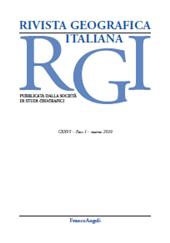Assetti fondiari e domini collettivi : il pluralismo giuridico in Italia
22-43 p.
Il presente contributo approfondisce il fenomeno degli assetti fondiari collettivi in Italia, attraverso una prospettiva inserita nel quadro della geografia giuridica. In particolare, la presenza di comunità montane che nel corso dei secoli hanno prodotto un proprio ordinamento giuridico, coesistente con quello statuale e composto da fondazioni socio-antropologiche, pratiche e consuetudini antiche ispirate ad un modello di società comunitaristico e reicentrico, evidenzia il carattere giuridicamente pluralistico dello spazio sociopolitico italiano. Pertanto, l'analisi mette in dialogo le peculiarità empiriche di tali istituzioni collettive con il concetto di pluralismo giuridico, nel tentativo di valutarne le positività sociali, ambientali ed etiche. [Testo dell'editore]
This article explores the phenomenon of Italian collective land structures, through a legal geography perspective. In particular, the existence of mountain communities that throughout centuries have produced their own juridical order, coexisting with that of the State and composed by socio-anthropological foundations, ancient practices and customs inspired by a communitarian and reicentrical model of society, highlights the legal-pluralist character of the sociopolitical Italian space. Therefore, the analysis connects the empirical peculiarities of these collective institutions to the concept of legal pluralism, in the attempt of evaluating their social, environmental and ethical positivities. [Publisher's text]
Is part of
Rivista geografica italiana : CXXXI, 4, 2024-
Articles from the same issue (available individually)
-
Information
DOI: 10.3280/rgioa4-2024oa18971
ISSN: 0035-6697
KEYWORDS
- geografia giuridica, pluralismo giuridico, assetti fondiari collettivi
- legal geography, legal pluralism, collective land structures


